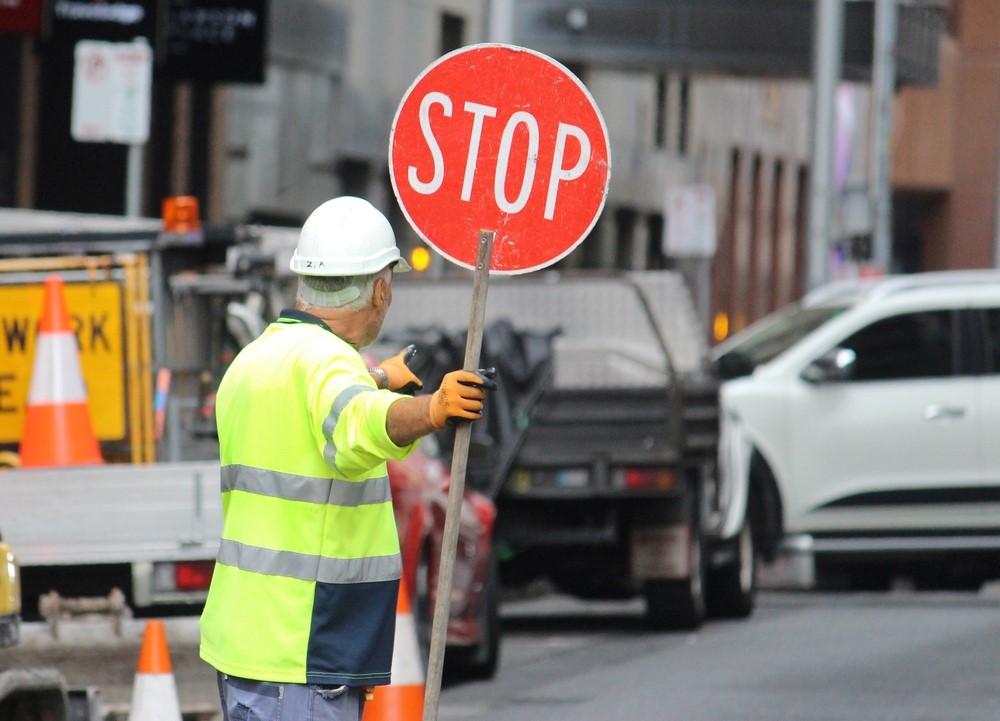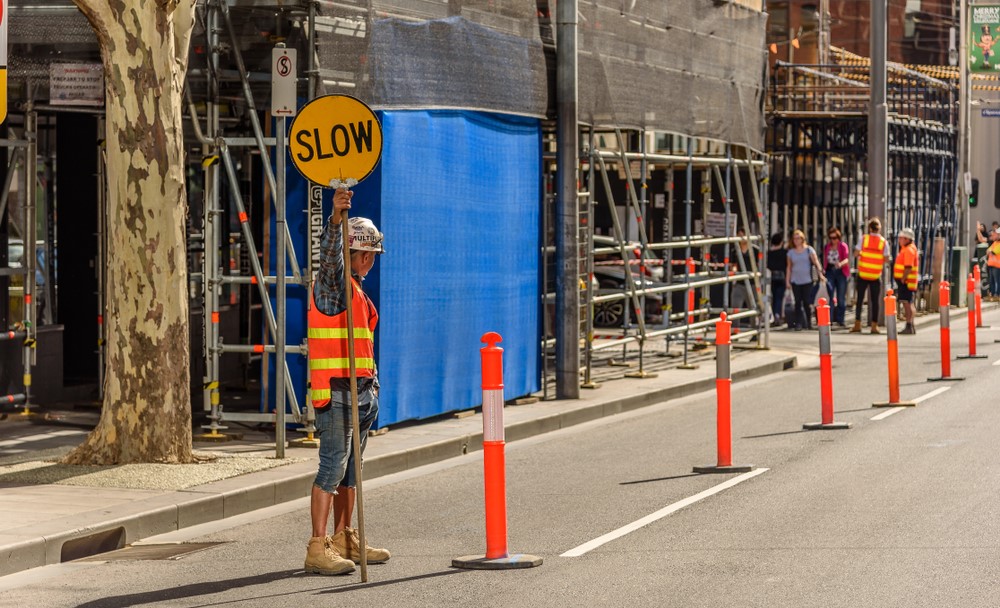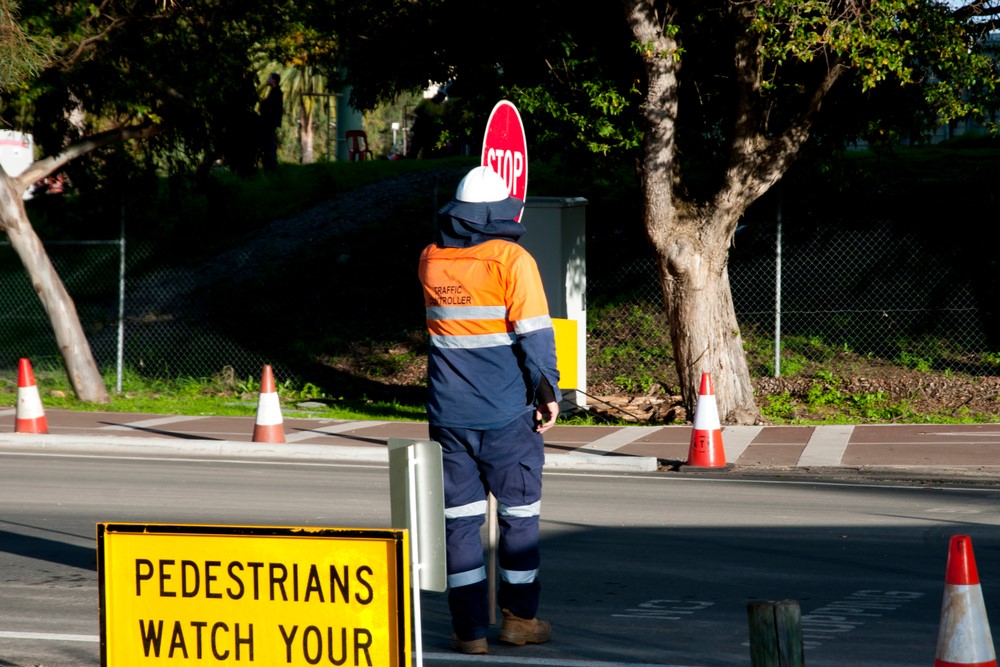Get A Free Quote
1300 007 782
Call Us On:
1300 007 782G10/RMS Accredited
Competitive Rates
ZERO Accidents or Injuries
25+ years combined experience
50+ years combined experience
Competitive Rates
G10/RMS Accredited
ISO Certified

Are you holding an event or running a construction site close to the road? In NSW, traffic control is essential if your project impedes on a public road or a shared footpath. Neglecting to put a traffic management plan in place puts the public and your workers at risk, potentially leading to fatal accidents and heavy fines.
Traffic control involves ensuring the safe movement of vehicles, pedestrians and cyclists around your site. In a city like Sydney, with large-scale events and heavy traffic, this is a complex process that requires strategic planning and clearances from the right authorities. A traffic plan is an essential component of your traffic management requirements that outlines details such as entry and exit points, loading and unloading areas, the responsibilities of your staff and the protocol in case of emergencies.
Among LED lights, barriers, tape and signs, one common element of traffic control you’re likely to see (especially at roadworks or accidents) is traffic controller personnel dressed in hi-vis. Traffic controllers require effective training to enforce the road rules in accordance with the relevant authority. In NSW, this requires completing a training course that teaches essential skills like understanding stopping distances, responding to changes in the environment and understanding Workplace Health and Safety (WHS) policies.
You may ask, ‘When do I need traffic controllers for my site?’ What specific situations require trained professionals, and when can you get by with simpler measures?
If in doubt, it’s always best to err on the side of caution. SSTC can help you meet your traffic management requirements, including, if necessary, highly trained traffic controllers.
There’s a lot more to being a traffic controller than wearing a hard hat and holding a stop/slow sign. Traffic controllers in NSW are required to acquire a White Card and complete courses in traffic control and traffic management. A White Card and particular qualifications allow traffic controllers to safely work in construction zones all over Australia.
What do traffic controllers do? In summary, traffic controllers direct motorists, cyclists and pedestrians near or adjacent to roads when construction projects, events, accidents or other unusual circumstances impact their routes. Traffic controllers are required to have effective communication skills, be strong sequential planners, and be capable of working in all kinds of weather conditions.
What do traffic controllers have to do throughout the day? The duties that traffic controllers need to carry out in order to meet traffic management requirements include:
It’s one thing to know what traffic controllers do, but when are they necessary? Here is how to know whether or not traffic controllers fit into your traffic management requirements.

Put simply, if your work takes place on or near a road, you will require traffic management of some kind. So when do you need traffic controllers to be physically present as part of your traffic management requirements?
While a strong traffic management plan is essential, different solutions will be required for different traffic management requirements. Deciding whether or not you need traffic controllers comes down to several factors, including:
Part of your traffic management plan involves assessing the potential risks of your worksite and its place on the road. The volume of traffic in the area, speed limits and visibility are among the factors that may cause hazardous traffic conditions at your site. Generally, the riskier the traffic conditions, the higher the likelihood that traffic controllers will be needed.
The layout of your own event or worksite plays a part, including access points, pedestrian crossings and intersections. Worksites with busier or more congested layouts may need traffic controllers to help heavy machinery, delivery trucks, vehicles, and pedestrians manoeuvre in a safer manner.
How much will your construction work impede on the surrounding traffic? Will there be heavy machinery entering and exiting the work site? If there are a lot of factors present that may increase the risk for motorists and pedestrians, the likelihood that traffic controllers are necessary increases.
Depending on the type of work, you may be legally required to have traffic controllers at your site. This is a matter of checking your traffic management requirements with your local authorities, which can be a complicated, in-depth process.
Here are some common circumstances that may not require staffing your site with qualified traffic controllers:
If your site is in a remote zone or an area with very low traffic, automated traffic systems might suffice. These control systems, which come equipped with sensors and timers, can be enough to control mild levels of traffic.
At scenes such as traffic accidents and short-term roadworks, signals and signs can be enough to warn motorists of temporarily changed conditions and divert traffic.
Traffic controllers may not be needed late at night or at off-peak times when there are fewer cars on the road. While traffic controllers aren’t always strictly essential for effective traffic management, they are undeniably important. And frequently, they’re necessary. The best way to determine whether or not you’ll need traffic controllers working on the premises is to contact a professional. A traffic management expert is best to assess your traffic management requirements and determine if you need traffic controllers present

If you’re not sure where to get started with traffic control, let alone what level of control you’ll need, SSTC is here to help. A security and traffic control company that works with both public and private organisations, our traffic control services include everything you need to carry out your work, including a traffic management plan.
With over 25 years of combined experience, our team are experts at procuring the right permits and clearances for your work. We’ll liaise with office regulatory bodies such as the Council, Police and RMS on your behalf and make sure everything you do is above board. Whether you need equipment, diagrams or in-person traffic controllers, we can assist you.
Trusted by some of Australia’s largest construction companies, we specialise in construction traffic control dedicated to ensuring staff and public safety around worksites. Driven by expertise, discipline and an unwavering commitment to safety, we can provide you with everything you need for a better, safer worksite. This includes detailed, expert construction traffic management plans, the right kind of equipment and qualified traffic control personnel.
Get in touch with the team at SSTC to discuss your traffic management requirements and get a free quote.